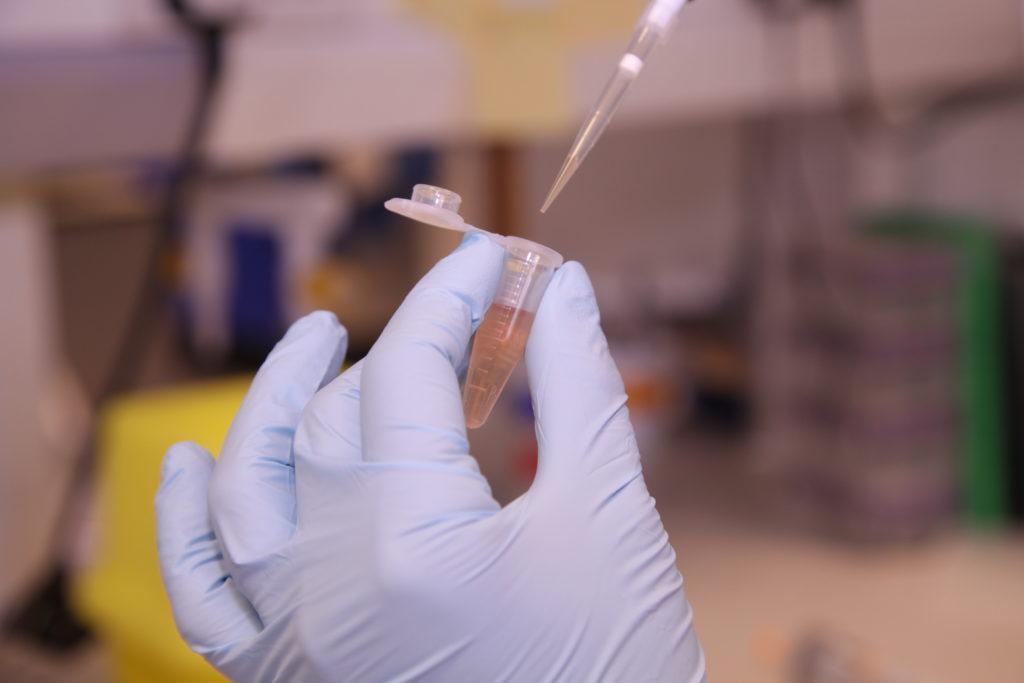Eliminating cancer stem cells: Scientists discover a novel drug target for aggressive blood cancer
Research published today in Cell Stem Cell has discovered a protein which drives an aggressive form of blood cancer, acute myeloid leukaemia (AML). Inactivation of this protein selectively compromises leukaemic cells while promoting normal blood cell functions.
 A major challenge in the treatment of blood cancers is the elimination of cancer stem cells (CSCs), which fuel the disease and are frequently resistant to current therapies. As CSCs are responsible for disease initiation and recurrence they represent desirable targets for treatment. The study, co-led by Professor Kamil Kranc (Barts Cancer Institute, Queen Mary University of London) and Professor Donal O’Carroll (MRC Centre for Regenerative Medicine and Wellcome Centre for Cell Biology, University of Edinburgh), addresses this unmet clinical need.
A major challenge in the treatment of blood cancers is the elimination of cancer stem cells (CSCs), which fuel the disease and are frequently resistant to current therapies. As CSCs are responsible for disease initiation and recurrence they represent desirable targets for treatment. The study, co-led by Professor Kamil Kranc (Barts Cancer Institute, Queen Mary University of London) and Professor Donal O’Carroll (MRC Centre for Regenerative Medicine and Wellcome Centre for Cell Biology, University of Edinburgh), addresses this unmet clinical need.
A new treatment paradigm in leukaemia
Under normal circumstances, blood stem cells in the bone marrow produce all the functional blood cells required to sustain life in a process known as haematopoiesis. AML is an aggressive disease of blood stem cells, which under pathological conditions acquire genetic changes that transform them into CSCs. These CSCs drive AML and propagate the disease. Currently available treatments for AML fail to fully eradicate CSCs and are also toxic to normal blood cells. Thus, it is of paramount importance to eliminate CSCs without perturbing normal haematopoiesis.
Funded by Cancer Research UK (CRUK) and Wellcome, the Kranc and O’Carroll teams found that a protein called YTHDF2 is required for CSC functions. By depleting the levels of this protein in pre-clinical AML models and human patient-derived AML cells, the researchers found that CSCs driving AML were selectively eliminated, compromising AML and disease progression. Not only did inhibiting this protein eliminate the CSCs, this targeting strategy also had the unique effect of enhancing normal blood stem cell production. They hope that by targeting YTHDF2 in the future, doctors may be able to effectively treat AML while promoting normal blood formation.
Professor Kranc said:
Our work sets the stage for therapeutic targeting of cancer stem cells in leukaemia while enhancing the regenerative capacity of normal blood stem cells. We hope this will establish a new paradigm in cancer treatment.
Blood stem cell expansion for transplantation purposes
Blood stem cells are used in the treatment of a variety of diseases; however, obtaining enough blood stem cells for transplantation is often a challenge. Inhibition of the YTHDF2 protein could be applied as a powerful method to expand these cells to overcome this limitation.
The next steps
The findings of this study highlight the potential of targeting YTHDF2 for AML treatment. The team will now work to find an inhibitor that targets YTHDF2, which they hope can be translated into the clinic for the treatment of AML. Although the current study focused on AML, researchers are exploring the possibilities that inhibiting YTHDF2 may have potential in treating other cancers driven by CSCs.
Professor O’Carroll who co-led this study said:
The study shows the promise of a novel class of drugs as the basis for cancer and regenerative medicine treatments.
This research falls within the remits of the new CRUK City of London Centre, a specialist hub for cancer biotherapeutics, which aims to be at the forefront of the development of new biological therapies for cancer in the UK and internationally.
Professor Kranc’s laboratory is also supported by grants from Barts Charity, Wellcome, Bloodwise, Medical Research Council and the Kay Kendall Leukaemia Fund. The study was carried out in collaboration with the University of Manchester, Harvard Medical School and the Université de Tours.
Category: General News, Publications

No comments yet